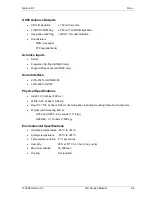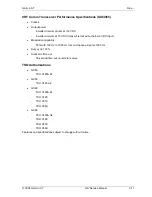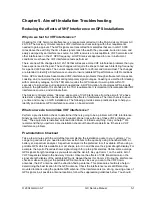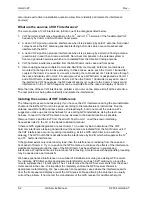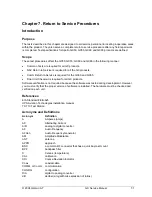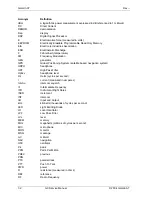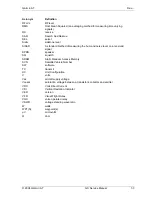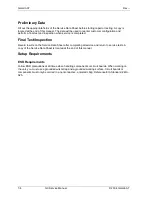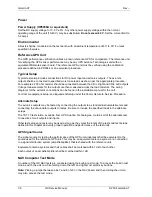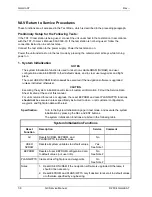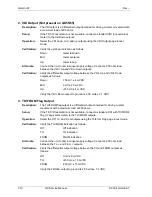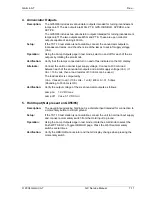
Garmin AT
Rev --
6-2
GX Service Manual
© 2004 Garmin AT
•
Parallel
I/O
ports
•
Watchdog Timer Unit (WDT)
•
JTAG test-logic unit
The two serial I/O ports on the microprocessor connect directly to the GPS receiver (J1) and the
communication Comm board (J4) and are used for direct control and exchange of data between the
CPU and these devices.
The configuration jumper (J2) currently has only one function. The built-in test mode can be accessed
by shorting pins 7 and 8 together, then turning on the GX unit. The built-in test mode can also be
accessed by turning the unit on while depressing the two outermost smart keys, or by issuing a
command by PC through the serial port.
Reset/Watchdog/Battery Backup Circuit
The Maxim Max690A microprocessor supervisory IC (U1) provides a reset output (pin 7) during
power-up, power-down, or during failing power conditions. Additionally, a reset pulse is output (pin 7)
if the watchdog timer input (pin 6) has not been toggled within the specified time period (1-2.25 sec.).
The Max690A also provides Vcc to battery switchover (Vout pin 1) for SRAM backup power when the
GX unit is turned off. Backup power is supplied by a 3 V lithium backup battery.
Memory
Flash Code ROM
The NAV board is designed to accept 2 MBIT (128K x 16), 4 MBIT (256K x 16), or 8 MBIT (512K x
16) flash memories in the standard 48 pin TSOP package. There are two sites on the board (U102 &
U103) that can allow code flash memory in the range of 2 MBIT to 16 MBIT depending on the parts
populated.
The board design allows the use of Intel or AMD flash memories. Software routines are required for
programming the flash memories on the board, and both the Intel and AMD parts are supported. The
flash memories include device and manufacturer codes that can be read. Therefore, the software can
determine the device types and execute the appropriate programming algorithms.
The flash memories are soldered directly to the board; they are not placed in sockets. The flash must
be programmed in-circuit. The 386EX and the on-board hardware supports utilizing the JTAG port for
initial flash programming. The parts are programmed with +5 volts, so a +12 volt power supply is not
required.
SRAM
The NAV board design uses either one or two 1 MBIT (128K x 8) low-power SRAMs (U104 & U105).
The SRAM uses battery backup to save the contents when the unit is turned off.
When using a single SRAM, the device is connected for use in byte mode. The chip select
configuration must be set to byte access by software.
When using both SRAM devices, they are connected to allow word access. The BLE and BHE
connections allow for aligned and non-aligned word access as well as byte access.
Summary of Contents for APOLLO GX SERIES
Page 8: ...Garmin AT Rev viii GX Service Manual 2004 Garmin AT This Page Intentionally Left Blank...
Page 12: ...Garmin AT Rev 1 4 GX Service Manual 2004 Garmin AT...
Page 24: ...Garmin AT Rev 2 12 GX Service Manual 2004 Garmin AT...
Page 26: ...Garmin AT Rev 3 2 GX Service Manual 2004 Garmin AT...
Page 27: ...2004 Garmin AT GX Service Manual 4 1 Chapter 4 Antenna Installation Guides...
Page 28: ...Garmin AT Rev 4 2 GX Service Manual 2004 Garmin AT...
Page 32: ...Garmin AT Rev 5 4 GX Service Manual 2004 Garmin AT...
Page 96: ...Garmin AT Rev 7 58 GX Service Manual 2004 Garmin AT...
Page 98: ...Garmin AT Rev 8 2 GX Service Manual 2004 Garmin AT Figure 8 1 GX55 Assembly Board Locations...
Page 122: ...Garmin AT Rev 8 26 GX Service Manual 2004 Garmin AT...
Page 130: ...Garmin AT Rev 9 8 GX Service Manual 2004 Garmin AT...
Page 140: ...Garmin AT Rev 10 10 GX Service Manual 2004 Garmin AT Figure 10 5 Comm Board Block Diagram...
Page 152: ...Garmin AT Rev 10 22 GX Service Manual 2004 Garmin AT...
Page 158: ...Garmin AT Rev 11 6 GX Service Manual 2004 Garmin AT...
Page 160: ...Garmin AT Rev 12 2 GX Service Manual 2004 Garmin AT...
Page 162: ...Garmin AT Rev 13 2 GX Service Manual 2004 Garmin AT...
Page 165: ......
Page 166: ......


